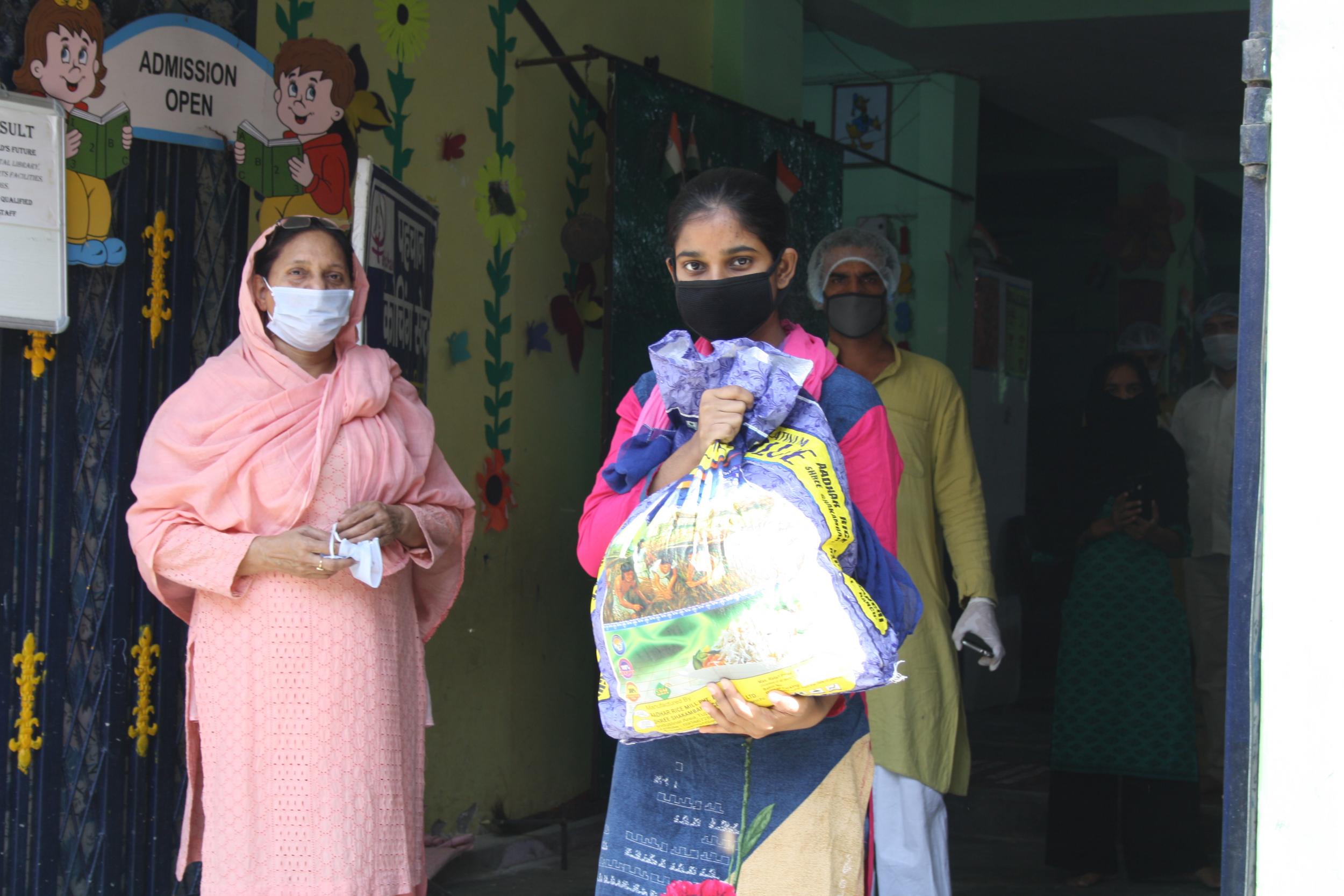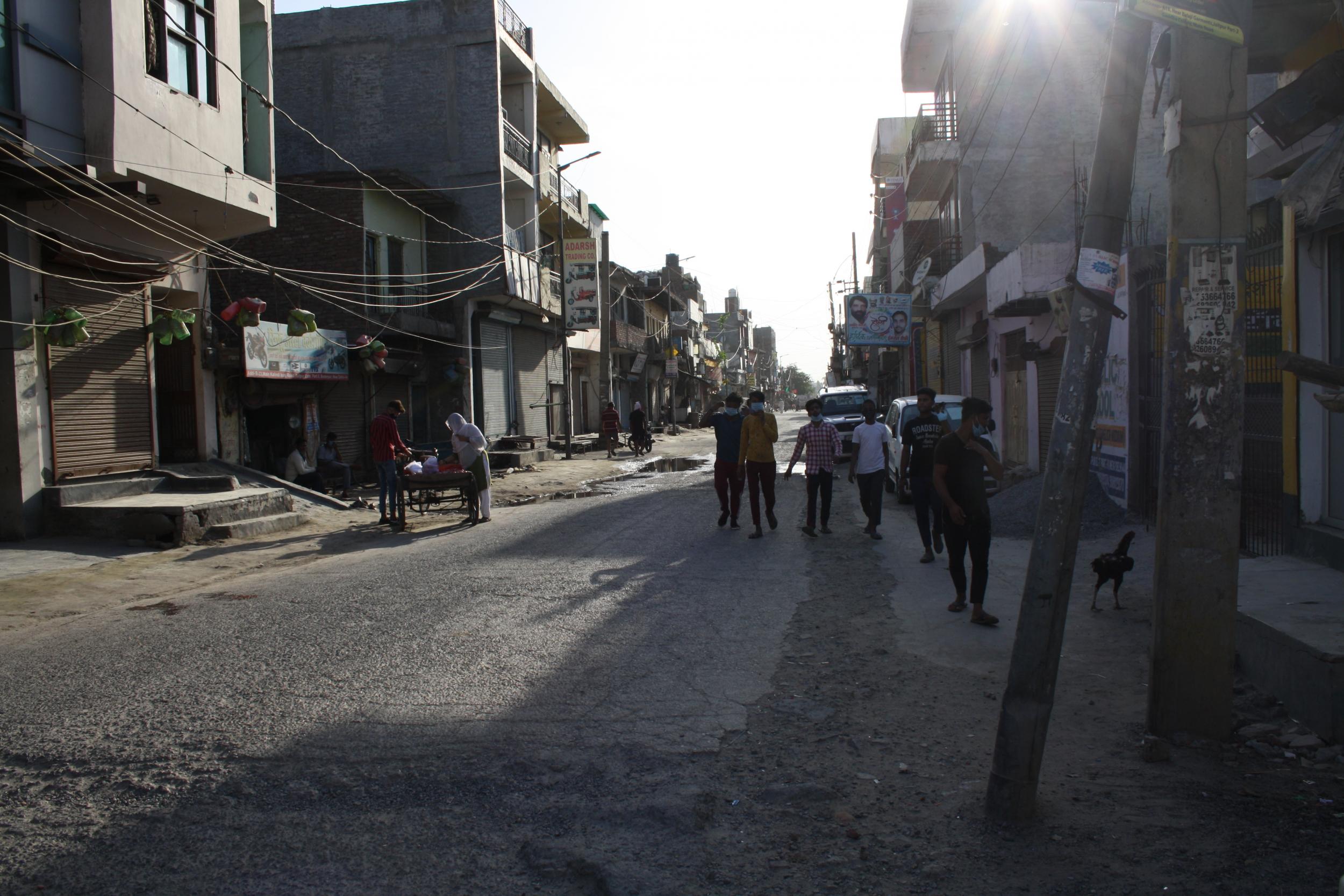The ones who stayed: How migrant workers stranded in Delhi fear for their futures
Deaths of scores of workers who fled major cities during India’s coronavirus measures have rightly led to public outcry. But the lockdown has been no less brutal for millions who chose not to make the journey, as Adam Withnall reports from Delhi


Afsana was just a baby when her father died, and her mother took her from Assam to seek employment and a new life in the Indian capital Delhi.
They made a home in Jaitpur Extension, a neighbourhood to the east of the city populated mostly by migrant workers and daily-wage labourers, and her mother found work as a home nurse for rich families. They had been getting by OK, for almost 20 years, until India went into a nationwide lockdown overnight on 24 March.
Despite public appeals by celebrities and politicians for households to keep paying salaries to their workers, and for landlords to waive rent during the pandemic, in the case of Afsana’s mother, neither complied.
They are some of the many millions of migrant workers who didn’t attempt the dangerous journey back to their home states on foot; who decided to wait out the crisis in their adopted cities, racking up debts and forced into the indignity of accepting charity food handouts; they are the ones who stayed.
“Since the lockdown began, it has been miserable,” Afsana tells The Independent, as she collects a sack of dry food rations from a distribution centre organised and paid for not by the government, but by the Indian social activist charity Anhad.
“Before, we could manage a living out of the salary my mother was making. But now, we are dependent on these sorts of handouts for food, there is nowhere else we can turn for any kind of help.”
Criticised over the way it handled India’s coronavirus lockdown, the Modi administration says it and state governments have provided hot meals and emergency accommodation to stranded workers, and belatedly opened up special train services to get them to their home states if required.
This week, a $270bn (£223bn) stimulus package announced by prime minister Narendra Modi to make India “self-reliant” in the time of Covid-19 also included a pledge to give two months’ free food to all migrant workers, no state ration card needed.
Yet inevitably there are cracks in the system, and Jaitpur Extension is one of them. It has no government school to serve as a makeshift food distribution centre, and people here say they feel like they have been forgotten by the government that imposed this lockdown on them.
For Afsana, 20, the immediate concern is not starvation, but the mounting debt she and her mother are entering into to keep a roof over their heads. Their landlord, she says, isn’t making them pay rent now – but expects it all back in full once lockdown is over.
“We are living on savings, but that will run out in 15 days. I am very worried about what happens then – I just hope the family where my mother was working will take her back when lockdown is over.
“My family understands the situation, the virus that is going around, but we are more worried about how we are going to make a living, because every day we are going into more debt. I understand what’s going on, but [when this is over] who is going to be understanding of the situation that we are going through?”
The food distribution on Friday in east Delhi – 40 packages of dry rations, each including enough rice, flour, lentils, salt and sugar to feed a family for a week – was paid for by Anhad but organised by a local institution offering courses to get high school drop-out girls back into education.
Its founder, Farida Khanam, describes how painful it was to see her community ripped apart the day the coronavirus lockdown was announced by Mr Modi in a primetime TV address to the nation.
“It was a very sudden move from the government, and the moment it was announced a lot of people just came out of their homes and started to leave. I saw people taking their kids on their shoulders and walking, going back to their villages, no matter how far the journey was.”
Khanam estimates that a quarter of the population of Jaitpur Extension has fled, many thousands of people, with a steady trickle continuing to go as they ran out of food and money over the past weeks. “It was really hard to take, seeing all the people I know actually just running out of food and everything that is essential to life, and seeing them in such a dilemma that they had no idea what to do [but go],” she says.
Mohammed Akhtar Alam, 23, moved to Delhi from the impoverished eastern state of Bihar just four months before lockdown began, and found work as a tiler on construction sites while renting a room where he stayed along with nine other men.

He says that eight members of his construction crew have left for their respective home states, but that he couldn’t face the journey. According to Indian media estimates, 134 migrant workers have died in accidents during their travels home, including 26 killed in a crash on Saturday morning involving a goods lorry overladen with passengers.
“I thought about going back, I wanted to go back, but I couldn’t find any means of doing so. I didn’t consider [walking] because I thought that it was a very long distance to actually go by foot,” says Alam.
He says he is lucky in that his landlord has waived rent, and has even been providing occasional food supplies to those who stayed. Between that and charity ration handouts, he has survived lockdown without starving.
“I didn’t get any kind of help from the government, in terms of rations or anything else,” he says. “Nobody, not even from the local assembly members, came by to actually talk to me or anyone in my neighbourhood. We haven’t received any kind of support from the government, so far.”
Migrant labourers are not the only people to have been badly affected by the crisis. Krishna Devi, 36, has been living in Delhi for almost three decades and owns and runs a small shop, selling tobacco and soft drinks.
She says she singlehandedly supported a household of eight, including five of her children and a nephew, with the money the shop made, but that it was shuttered as “non-essential” when lockdown began.
“We have had no income for months, I have been asking for money from people just to survive, and coming to places like this that have been helping us with food rations,” she says.
Like many working class people in India, she does not have documentation from Delhi state – she’s originally from Bihar – and so was relieved to hear the finance minister Nirmala Sitharaman announce this week support measures for all workers in need, whether they have government-issued ration cards or not. But when she went to collect state-issued rations on Friday, she was turned away regardless.
“I am in favour of the lockdown, but I am not in favour of how it was done so suddenly, how it was managed,” she says, with tears in her eyes. “We have been left dependent on other people lending us money, and I am more worried about having to pay it all back [than about the virus]. We’ve gone into so much debt, it is going to be a major problem to pay back those people and get our lives back to the way it was before. It’s a major worry.”
India’s current phase of lockdown was set to end at midnight on Sunday, with new measures from Monday likely to involve more opening up of major cities such as Delhi, even as virus cases continue to rise. India as a whole has recorded more than 90,000 Covid-19 cases and almost 3,000 deaths, numbers that are yet to peak.
But even if lockdown measures were lifted entirely from Monday, millions of daily-wage workers will face ongoing uncertainty until the Indian economy – already struggling before the pandemic – grinds slowly back into gear.
Join our commenting forum
Join thought-provoking conversations, follow other Independent readers and see their replies
Comments